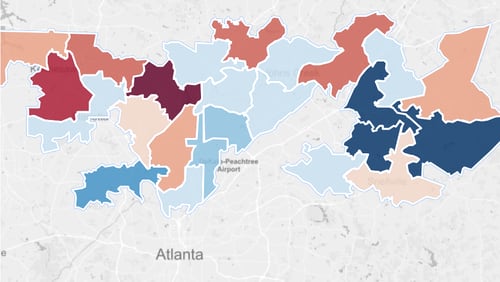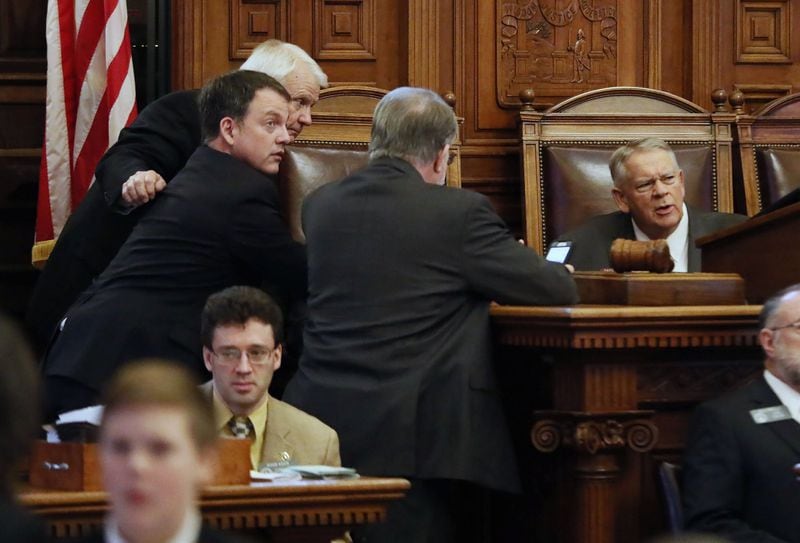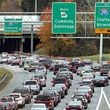With Georgia as a battleground in next year’s elections, Democrats see an opening to break up Republicans’ control of state government by taking over the state House of Representatives.
It won’t be easy.
While Democrats have gained ground in the past two election years, they remain 16 House seats short of becoming the majority. Republicans held a 105-75 advantage this year.
To flip the House, Democrats would need to close significant margins with Republicans, according to a review of election results by The Atlanta Journal-Constitution.
Democrats are targeting the 16 seats where a Republican won with less than 58% of the vote last year. In addition, Democrats couldn't afford to lose many of the 11 House seats they picked up last year, including some in Republican-leaning districts.
The stakes will be high because the party that wins the 2020 legislative elections will have substantial power in redrawing district lines the following year, helping to ensure they're in position to retain their seats for years to come. The majority party sets the agenda on Georgia's most contentious political issues, including abortion, guns and taxes.
Democrats are counting on voters outraged over a law that prohibits most abortions after a doctor can detect fetal cardiac activity, while Republicans believe their backers will turn out in support of the anti-abortion law.
State House Minority Leader Bob Trammell said Democrats are "poised to make big gains," especially in suburban districts that are trending away from Republicans.
“We’re in a good position largely because voters are reeling from the state’s rightward tilt when it comes to social issues,” said Trammell, who represents Luthersville. “There are more competitive districts than there have been in the life span of the present political map that we’re under. Georgia has shown itself to be a purple state, one that is very close.”
But the competition in swing districts goes both ways. Trammell’s seat isn’t safe after his district backed Donald Trump in the 2016 presidential contest and then re-elected Trammell with 52% of the vote last year.
State House Speaker David Ralston said he's confident that voters will pick Republicans to lead the state following the party's emphasis on economic prosperity and transportation improvements. He said he believes Trump will win Georgia again, helping down-ballot candidates.
“We have to be very clear-eyed about where we are, but I think we have a good message,” said Ralston, who represents Blue Ridge. “This is certainly a Democratic Party the likes of which we’ve never seen in Georgia. I don’t think that’s an identity or a set of views that Georgians are going to embrace.”
Some of the most vulnerable districts stretch across metro Atlanta’s northern arc, covering Marietta, Alpharetta, Cumming and Dacula. Other competitive districts are also located in the suburbs of cities including Athens, Columbus and Savannah.
Republicans gained a majority in the state House in 2004 for the first time in 134 years. They were propelled into power by new court-drawn legislative districts and strong showings at the top of the ticket, when President Georgia W. Bush won re-election and U.S. Sen. Johnny Isakson earned his first term.
In that election, Republicans gained 19 seats and three Democrats switched parties afterward. That gave them 99 votes in the House — out of 180 seats — a majority they’ve held ever since.
State Rep. Sharon Cooper, who first won election in 1997, remembers the transition but doesn't think Democrats will accomplish a similar feat.
“Picking up 15 more seats is a pretty far stretch,” said Cooper, a Republican from Marietta and chairwoman for the Health and Human Services Committee. “A lot of Republicans stayed home last time, and I think they realize how important it is now to go out and vote.”
Many of the Republicans targeted by Democrats are House members in leadership positions, including Cooper, state Rep. Chuck Efstration of Dacula, state Rep. Bert Reeves of Marietta and state Rep. Ed Setzler of Acworth, who sponsored Georgia's anti-abortion bill.
On the other side, the most precariously positioned Democrats are freshmen who just won their seats for the first time last year in the first election since Trump won the presidency.
State Rep. Jasmine Clark, a Democrat who flipped a Tucker-area seat in the fall, said she expects Democratic momentum to continue statewide after she won election by less than 2 percentage points.
“My win was not a fluke,” Clark said. “If we could get at least one of our chambers to be Democratic, it would force a little bit more bipartisanship. It’s very much within reach. Democrats in Georgia are galvanized.”
The state Senate is more secure for Republicans, who hold a 35-21 majority. To flip seven Senate districts, Democrats would likely need to win seats that Republicans won convincingly last year.
Democrats would likely benefit from a strong candidate for president who drives turnout, even beyond the record midterm numbers when the gubernatorial race between Democrat Stacey Abrams and Republican Brian Kemp motivated voters. About 57% of registered voters participated in November's election; the 2016 presidential election had 77% turnout.
"There are so many factors that are above and beyond what I do in my state race," said state Rep. Mary Frances Williams, who won her Marietta district by less than 1 percentage point last year over an incumbent Republican. "The numbers are changing. It's a question of who gets their voters out."
Republican state Rep. Ron Stephens, who has represented Savannah since 1997, sees an opportunity for the GOP to retake some of the seats it narrowly lost in 2018.
“It’s going to be a tough year, no question. But some of those seats we lost were razor-thin,” said Stephens, who retained his district with 52% of the vote. “We’re going to go back and pick up some of those tight seats.”
Close races might hinge on disaffected voters who don’t always participate in elections — the kind of voters that helped Trump win, said Dan Franklin, who recently retired as a political science professor at Georgia State University.
During next year’s election, it’s the Democrats who will be the party that attracts those voters, he said.
“Republicans should be worried because in a presidential year, turnout will be larger and that tends to benefit Democrats,” Franklin said. “I would expect the Democrats to do well because they are at least as motivated as the Trump voters.”
Vulnerable House seats, with 2018 vote total
Republican
Rep. Dale Rutledge, McDonough, 51.5%
Rep. Sharon Cooper, Marietta, 51.6%
Rep. Mike Cheokas, Americus, 51.8%
Rep. Deborah Silcox, Atlanta, 52.3%
Rep. Ed Setzler, Acworth, 52.3%
Democrat
Rep. Mary Robichaux, Roswell, 50.3%
Rep. Mary Frances Williams, Marietta, 50.4%
Rep. Jasmine Clark, Tucker, 50.7%
Rep. Angelika Kausche, Johns Creek, 50.7%
Rep. Gregg Kennard, Lawrenceville, 51.4%
Stay on top of what’s happening in Georgia government and politics at www.ajc.com/politics.










